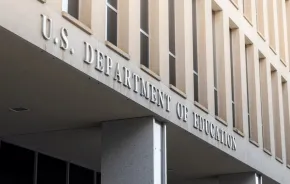
Photo:
Courtesy and ©️ Bill & Melinda Gates Foundation
Editor's note: This article was sponsored by the Gates Foundation Discovery Center.
On a recent school day, social studies teacher Todd Baker sprinted around his Maple Valley classroom, holding out a microphone for students to discuss global poverty and hunger.
The high school students were attending a free virtual class presented by the Gates Foundation Discovery Center. The class is one of hundreds the organization has hosted during the pandemic.
The students “felt they were being heard and their opinions meant something,” says Baker, who teaches at Tahoma High School. “The presenters are dynamite — they’re really good at being patient, willing to answer questions and to guide [the students].”
Since launching these online offerings in the fall of 2020, the Discovery Center has hosted about 450 virtual school experiences on topics such as sanitation, COVID-19 vaccines, data interpretation and gender equality. From writing their own pandemic poetry to debating toilet bowl designs, participating students are engaged in personalizing global topics in ways that inspire them to consider what actions they can take in their own communities.
Staying relevant
When the pandemic forced the Discovery Center to cancel in-person field trips in March 2020, staff members brainstormed ways to continue student interaction. They considered how to create virtual classroom experiences through which students could explore and debate timely global topics. The center launched the new offerings that fall.
“[We decided to] reinvent what we’re doing so we can stay relevant, even though we’re not hosting in the space in person,” says Patrick McMahon, manager of visitor engagement and experience at the Discovery Center.
Now, the center offers 55-minute virtual classes Monday through Thursday during local school hours. The nine presentation topics relate to the Gates Foundation’s global work, which means there are many specific examples to share. Presentations are adjusted for the students’ grade level, starting at fourth grade. While most participants who join virtually are from the greater Puget Sound area, the programming has attracted student groups from around the country and world, though differences in time zones can sometimes make conducting the classes tricky.
An interactive approach
This year, the Discovery Center launched two new topics: one on the global sanitation crisis and another on gender equality. Staff also updated ongoing classes, including a popular one on COVID-19 that delves into the timely topics of vaccines and variants.
In another class about COVID-19, titled “COVID-19: Global Vaccine Challenge,” the presenter will ask students to consider who should have access to vaccines and why. In one session, a student felt strongly that the supply should go first to countries where the vaccine was developed. In another class, students insisted the limited supply should be distributed equitably worldwide.
“There isn’t a truly right answer,” says McMahon. “We invite students to grapple with some of the same conversations world leaders are having.”
Along with asking tough questions, the presentations include other interactive elements. For example, students joining the class on the United Nations’ sustainable development goals are asked to take a poll: Has global extreme poverty worsened, stayed the same or improved? Many students are surprised to learn that figures have improved.
“Part of our goal is to remind them that progress has been made,” says McMahon.
In the class on sanitation, students dig into the complexity of waste removal, enjoying a few “super tacky” poop jokes along the way. But even those lighter notes offer a starting point for discussion. Why is the topic of poo taboo and what does that stigma mean for sanitation efforts?
“An element of humor is a nice way to bridge a major topic and challenge,” says McMahon.
The presentation goes on to discuss new technology and tools for processing waste, including recycling or reusing water, as well as the logistics of keeping public toilets clean. Seattle-area students can connect these broader topics to local issues, such as sewage overflow in Puget Sound.
Storytelling can also play an important role in keeping students engaged. A data class starts with a fictional scenario: The mayor of Chicken Town is reviewing a graph charting data on sunburns and ice cream sales. As sunburns increase in the community, so do ice cream sales. He’s considering a policy to ban ice cream sales to avoid the sunburns that seem so clearly connected.
“It’s a nice opportunity to think about causality versus correlation, which is a huge topic when talking about data,” notes McMahon.
Next steps
Along with working on developing new presentations — climate change is on the agenda —center staff is also creating longer virtual workshops for spring and summer breaks. These will go even deeper into topics and include guest speakers. The staff is also planning online events for special days, such as International Women’s Day in March.
Even when the Discovery Center ultimately resumes in-person programming and events, the plan is to keep some virtual offerings. Along with expanding student access, these virtual classes have spurred deep thinking and powerful conversations, educators say.
Baker has personally witnessed these conversations continue beyond the virtual classroom session. After the recent session examining the United Nations’ sustainability goals, several of his students approached him about getting involved in the school’s community service club. They also inquired about student volunteering opportunities at the Gates Foundation itself.
“They were just so inspired,” he says.
To learn more about the lineup of virtual experiences offered by the Gates Foundation Discovery Center or to book one, visit the website.
|
Sponsored by: |
 |











